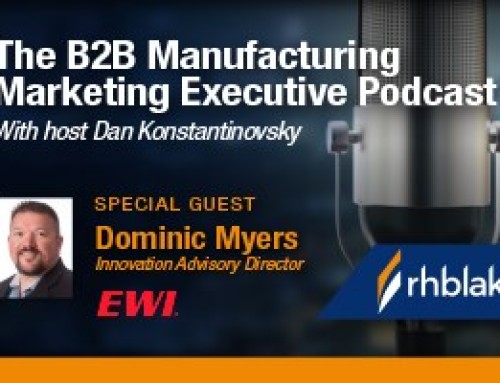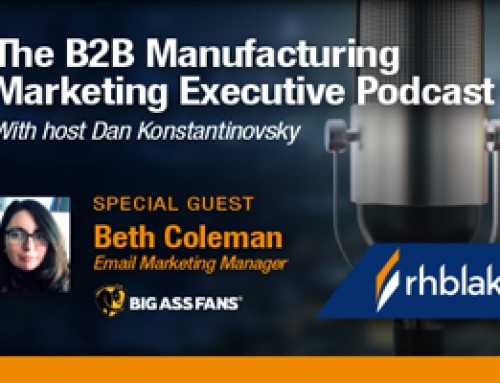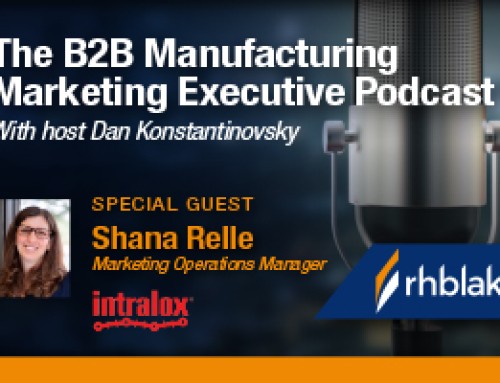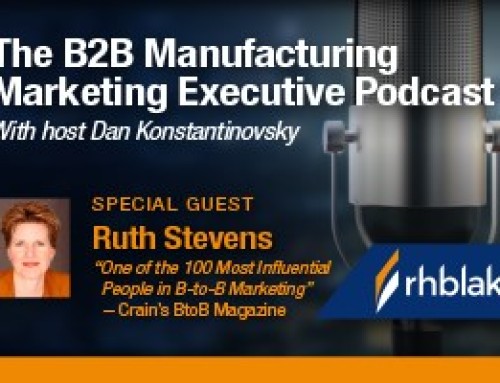Interview with Justin Hanson
Welcome to the B2B Manufacturing Marketing Executive Podcast.
If you want to learn how leading B2B Marketers are achieving excellent growth results, you are in the right place. This episode is brought to you by R. H. Blake a leading B2B and manufacturing focused marketing agency. To learn more, visit rhblake.com. Now here is your host Dan Konstantinovsky.
Connect with Justin Hanson, Product Marketing Manager, Impartner Software
Appreciate it. Thanks for the invite.
You bet. My background is pretty varied. It’s not the traditional path in marketing. I started off thinking about going into academia and I taught, for about six years in a university setting, doing writing and stuff like that. I then decided, “Hey, I actually like marketing a lot, and the idea of business and everything associated with it.” I started doing basically community building, course strategy, plenty of things with marketing, go to strategy, and then I decided to do industrial manufacturing … basically everything having to do with industrial for a while. I worked for a company and did a lot with email content, campaign strategy, sales enablement, sales and marketing software, and learned a lot more along the way.
I then transitioned into a product marketing, channel marketing, and always continuing with that campaign strategy. Something I always had a passion for … the idea of just thinking about the whole campaign, and the experience that our clients have, or anyone that we are working with, or even just marketing to. Providing them with value and providing them with something that’s actually useful to them, rather than just bugging them, because we all know how easily you can get bugged by bad marketing.
So that’s my personal background when it comes to marketing and business and so forth. When it comes to Impartner, we are essentially a PRM company. You’ve probably heard of CRM company or CRM in general, Salesforce, they being the foremost player in that space. PRM is a partner relationship management. So we just basically substitute the P for the C there and that is concerned essentially providing your partners or managing your partners, similar to how you would with a customer.
Impartner in particular is essentially the number one player within the PRM space, We’ve been around since 1997. Basically the most award-winning provider of channel management technologies in existence, and we have top tier partners. You have to be very precise when you are working in the partner space. I like to call them partners, even though they are our customers. So we have clients like, Honeywell, and Qualtrics, Xerox, to name a few. We have clients anywhere from the smaller to as big as you can imagine.
I was just about to ask … so PRM, you alluded to that maybe not too many folks are familiar with that market. Is that a term that Impartner created or was the term developed by somebody else? Could you talk a little bit about that?
To my knowledge, we were the ones who originally started using that term and it has since been widely adopted in the industry now. That is essentially if you are going to do an SEO strategy or if you were going to do an ads campaign, you would target PRM, partner relationship management and so forth. So it’s not a very common term to someone who is not within the space, or who has not had some experience with channel marketing. Within the last, perhaps 10 years that term has become much more ubiquitous within just the business world in general.
But we are essentially the leader within the space and again, we’ve been around longer than anyone. So we have the infrastructure built up around that, for expanding a particular company’s capacities when it comes to say, growth. So there really are not a lot of players within the industry at all who can go from basically having a few partners to whatever you can envision for your company. That’s basically who Impartner is, and we excel in growing our clients’ revenue immediately, like within the first year. We’ve been responsible for essentially millions of partners — that is our clients have worked with millions of partners. We have a huge infrastructure and we can handle essentially anything — that’s the background of Impartner.
There is plenty more to say, but you wonder where to stop; however, that’s where we are at.
So as far as channel marketing in general, you can substitute partner for channel. If you are doing an SEO campaign or an ads campaign, then you would target partner and channel in a similar way. So really channel is a way of just referring to partners. And you can have channel or partner marketing, let’s say, on any level. When I think about this, I think my approach to growing in general. And that’s the way that you should really think of partners and channel is being able to grow your company and pretty much exponentially in some cases, depending on the size of your company, of course.
But my approach to marketing, there is only so many ways, in which you can grow your company or channels that you can use. From the earliest days there was just cold calling and that still happens. I consider that as shots in the dark kind of thing. Then of course you can pay specifically to do ads or you have SEO. Then the way that I think of, let’s say, the last one, is you are paying to use someone’s traffic. You could say the same with ads and SEO to a certain extent. But specifically in this case, you are literally utilizing someone else’s traffic, so you’ve got social, you’ve got trade shows. Then, of course you can simply just partner with someone, through let’s say influencer marketing or something like that, to where they partner with you. The relationship that you have with a partner can be really variable.
There are so many different ways that you can partner. They can actually sell your stuff from, let’s say, social media, if they are an influencer. So there are a lot of different ways, and this is critical to thinking about channel marketing in general. You can have affiliate marketing, that’s a common one with consumers. The main difference with a B2B, I would say is the complexity. That’s really, in my opinion, what B2B is in general. The complexity is much greater, because every part of B2B is, let’s say, if you want to make one decision, you’ve usually got a committee making a decision on anything. Within B2B, everything is bigger, everything is more complex, there are just more players involved. That’s really how I would define channel marketing at a good way. Let’s say, think of channel marketing in general from a theoretical perspective. Does that make sense?
Really any company at all. And that’s a good customer base. But it’s really, that’s what it comes down to. It’s like if you have any product at all, you can benefit from using other people to partner with you. That is really a sincere way and you can think about how a partner can influence the growth of your company. People have partners, even if they don’t realize it. If you sold your product to someone, another company, and they are like, “Man, we really love this product. We are going to tell some other people about it.” It’s not really you haven’t said, “Hey, we want you to sell our product for me.” But that’s kind of the Holy Grail when you have an advocate, of someone that you’ve sold to.
That’s the idea … all of us want to have those advocates from a customer perspective. What a partner is, is essentially a super advocate, who is selling your product. And they may be doing something, let’s say they have a specific in, with a company, let’s say they do a lot of consulting, and they are able to say, “Hey, this is the best product. We’ve used everything, we know for a fact that this particular product is the best. You are paying us to consult with you, so this is what we recommend.” Having someone to do that, that is a form of a partner. And again, there are just so many different ways that you can think about a partner. Really any industry can benefit greatly when it comes to partners.
We definitely have tons of experience with that. Most of the time when we have, someone is interested in just expanding, let’s say their reach, through partners, we definitely have a ton of experience. We don’t really have, a formal consulting aspect of our company. That is you pay us this amount of money and we do that. And we tell you, “Hey, this is…” But we do have an absurd amount of experience with tons, basically every different type of company you can imagine. So we see it all.
Now, when it comes down to, do they already have a bead on it? Of course, most of our clients have knowledge about their own sales team, and particularly if they are a huge multinational company. They have a tremendous idea about their own sales team. So what they do is they come to us because we have this experience, and they have an idea, “Hey, we want to grow.” They may actually have a tremendous idea of what they want to do with their partner program. As they move into, let’s say implementing the software, they begin to understand, “Hey, we are going to run into some issues here.” So then we talk through, “Hey, these are the ways to solve those issues.”
It’s like anything when you move into a new type of marketing. You begin to work through something, and something comes up and then you say, “Hey, I would actually like to do this, because we would like to expand what we are doing with our partners” and then you begin to implement new things. So it varies tremendously with whoever you are working with. But we can definitely guide them down the path, and because we have been doing this for so long, we essentially have outlined pretty much everything that they are going to need and we’ve put that into a form of our software. That’s really what we see with our clients.
Justin Hanson
Product Marketing Manager
Impartner Software
Absolutely, and that comes down to when we are doing an exploration of what they want, we can ask them these questions. Because we’ve actually seen, “Hey, we’ve seen this with a specific company.” Or we can even make suggestions, “Hey, is this something you’ve maybe thought of, with your strategy?” Then they are like, “Oh man, no, we didn’t even think of that.” So we can definitely do that, and that’s a huge part of who we are as a company, being able to provide that insight.
Wow! There are a lot of them. I would say looking at it from a challenge perspective, and thinking about it in problems. That’s a good way to think of what… So you think about these problems, in order to have a solution. So it’s essentially at every step, there are so many steps within the partner process. Really what we do is, and when you start talking about PRM, it’s a discipline within itself. So you start to look at well, “What are the stages?” We think about the customer journey, let’s say, from a marketing perspective. But you start to them say, “Well, what’s the journey of someone, who’s within becoming a partner? From recruitment, to measurement and all that stuff and empowering them.
So I like to think of it from, certain problems. And again, there is really not enough time to go through every aspect of what you are going to encounter. But I would say so, thinking about problems. So one example, let’s say, so you have recruited people, and they are actually working for your company and things are going fine. But then there is an instance where, you have a couple different partners who are talking to one potential client. So you got to think of it as this level. So now they are talking to one of your potential clients, but they are getting them for you, of course. So you have two partners who are talking to a potential client. So how do you figure out, who should get credit for that?
So a simple way to solve that, is by having deal registration — that is basically whoever signs up for it first, gets credit for it. But at the same time, they are signing up through your interface, within the PRM software, that is then linked to your CRM. So then you have all of that easy linkage and all of that information flowing from one to the other. So you don’t have any issues to where one of your partners is calling and saying, “Hey, I should get credit for that,” and you are like, “Well we can see here that partner A, actually signed up first.” So that’s the process. Of course you’ve explained this to them, through other features of, let’s say the software to where you can send them emails, you can send them notifications. You can provide them with information, when they first sign up, when you are onboarding them, all of that stuff. So these are steps in the process, but that’s one problem.
The other one is empowering your partners. I’d say maybe a little bit of a next level. You get people enrolled and they are selling for you, but it doesn’t have to be, particularly if you are a larger company. Having the ability to empower your partners, because in most cases, your partners aren’t necessarily as large as you. So you’ll have people who are very large, multinational companies, the biggest in the world. However, they have partners who don’t have the ability to let’s say, do marketing campaigns.
So something you can use in order to empower them, as an example, is what’s called TCMA through channel marketing automation. This just allows you, essentially we as marketers, like marketing, of course, and we understand the power of marketing. So this allows you to empower your partners to do marketing for themselves. A great example of this within what we have is, running Google ads. So Google ads for the channel is one thing that we offer. So a situation you might run into is, you want to empower your partners to run ads on Google — so, how do you do that? You just provide them with some money. Now we have a way of doing that as well, but in this case, you actually want to run the ad campaigns.
So you are going to be running all the ad campaigns for these, let’s say, regional partners. With this particular solution that we have, you are able to run these, you are able to use big data, and you are able to utilize all of the information from all of these campaigns, to make informed decisions, within the ad campaign. Now, another thing that you’ll run into, is what I call, inter-partner competition. So essentially you know how Google ad campaigns run. So let’s say that you’ve got, one partner who is benefiting in this region from a Google ads campaign, but then you have another person and then you are another person, and if you are making bids on these, you can drive the price up. And so what we’ve been able to do, basically we have a preferred relationship with Google. We are able to make it so that there is no competition, in between all of these people, so that you are not artificially driving up the price of the ad bids.
So we are able to utilize that feature, through-channel marketing automation, TCMA, to ensure that isn’t happening. But that is an issue you might not think about, if you are going into these, you are like, “Well, we want to empower our partners, because if we can empower our partners, they are able to sell more, they are able to sell more effectively.” But then you run into these issues of, “Well, do we have to have these ad campaigns, as separate campaigns? Are we driving up the price?” That price could just skyrocket, if you are all competing against that same campaign.
So this is a way to solve that. Again, this is just one issue that you might run into. But it’s a very good solution to that problem. It’s something that we’ve thought about, and we’ve experienced in the past. So we were able to solve this issue, by coming up with this, but that is a way to empower. So these are some of the issues, just thinking about the process, the problems that you will encounter and how to solve those problems, ways to empower your partners and then adoption is a critical component of this as well. Because if you are running all of this, you are devoting so much time, to try to get your partners to adopt this, but it’s so difficult for them to adopt or it’s too costly.
In the case like TCMA you are able to enable adoption, through providing this for them. Because really all they have to do is just be there and say, “Hey, that works.” And then just talk to you and coordinate things, when it comes to a landing page and so forth. So you are able to help them to adopt this, so that they can be more successful. Because that’s a critical component, to having a successful partner program is adoption. If it is too cumbersome or it is too complicated, they will not adopt it. So all of your money and your investment are wasted. Being able to have instantaneous adoption, because it’s just a seamless process, is critical to what basically managing your partners and your channel.
Another critical part is the big data. The big data that’s coming in, through all of these partners, because with any ads program, the more data you have when you start targeting a certain set of keywords, you don’t just say, “Okay, it’s good. We are going to put millions into that one keyword.” You have to see what’s going on, and you have to adjust. So having more data, more information through all of these different companies together, allows you to make these incredibly informed decisions, about what’s working, what’s effective. This is another benefit of having all of these companies working with you, is you are able to see all of the benefits, through one specific let’s say campaign.
Absolutely. And it becomes more efficient, you are paying less for more. Another thing that I’d like to point out, this is more your ability to be responsive. We think about current economic conditions right now, and we all know that things are a little rough right now, and within companies the first thing that happens, is you start to say, “Well, we got to hold back, we got to cut off. Let’s say purchasing that bit of software, or we are going to use that consultant, but we can’t really afford it right now.” So the idea with using a partner, is you are able to leverage the capabilities of other companies.
This is particularly important, let’s say for someone where you are dependent on the supply chain. Because in many instances you have what you have in your, let’s say if you have a warehouse, depending on the size of your company. So you might have a whole bunch of a specific product, and you are like, ‘Well, we are struggling to sell this particular product. But hey, there is this partner that we have, who actually has a really good approach or has really good customer base, that would be perfect for this specific product, that we are trying to sell.” So you become much more, in a case like now, where you’ve got all this inventory of this specific product sitting in your warehouse. You are able to utilize your partner infrastructure in order to sell that.
We talk a lot about, basically a partner ecosystem. Thinking about a partner ecosystem, is essentially you could think about it as a kind of, you are a farmer, and you’ve got a bunch of plants, they are your partners. You’ve got different types of plants, you’ve got lettuce, you’ve got carrots, and you’ve got strawberries. But you have to provide them, they are different types of partners, so you have to provide them with different capabilities. They require different expertise from you in different ways. So thinking about it from a partner ecosystem, this ecosystem creates new market opportunities through basically your nurturing. They create these new market opportunities, because that wouldn’t have been there otherwise, had you not made that connection.
That is really the power of having a partner program, is that you are much more flexible. You are much more versatile when it comes to difficult times, such as like, we seem to be approaching now. We’ll see where everything pans out. But people are tightening down a little bit, but that’s the idea, and that’s the power behind having partner structures that setup … a partner ecosystem. So that’s another really important part when it comes to the challenges, but also the benefits that you gain through this.
Absolutely.
Okay, great. And it’s Impartner.com, if anyone’s interested, if they are just listening. But absolutely, we’ll include those links. If you want to talk to me or get in touch with me, LinkedIn, is the best way, at Justin Jeff Hanson, which we can include as well.
You bet. Thanks for having me, Dan.
Okay. Bye.








